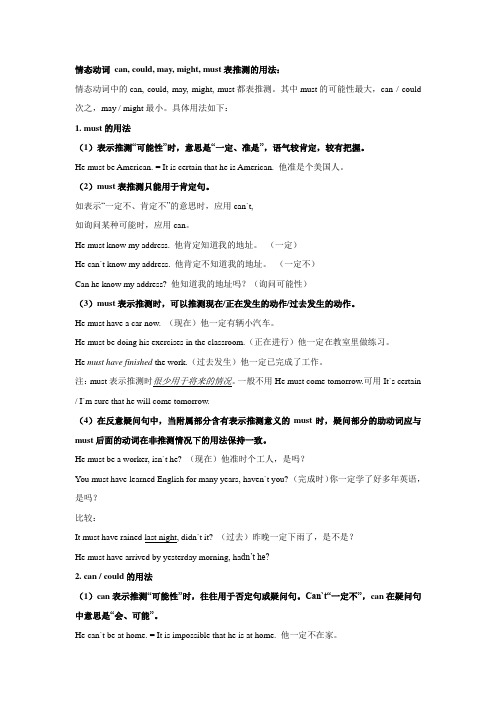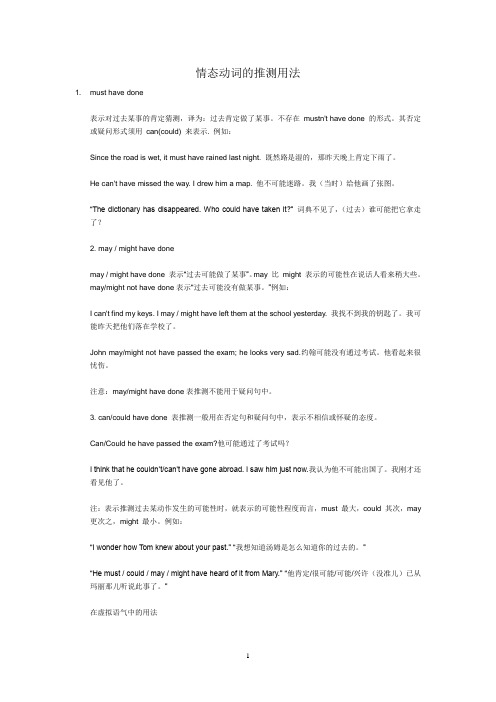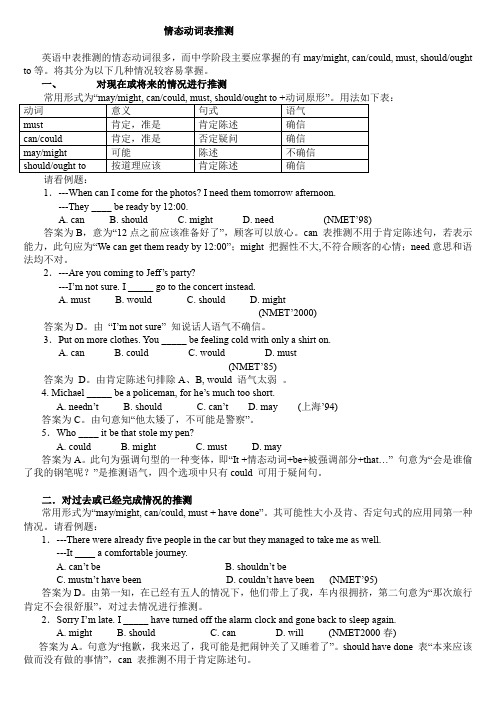情态动词表推测
- 格式:ppt
- 大小:603.00 KB
- 文档页数:7

情态动词can, could, may, might, must表推测的用法:情态动词中的can, could, may, might, must都表推测。
其中must的可能性最大,can / could 次之,may / might最小。
具体用法如下:1. must的用法(1)表示推测“可能性”时,意思是“一定、准是”,语气较肯定,较有把握。
He must be American. = It is certain that he is American. 他准是个美国人。
(2)must表推测只能用于肯定句。
如表示“一定不、肯定不”的意思时,应用can`t,如询问某种可能时,应用can。
He must know my address. 他肯定知道我的地址。
(一定)He can`t know my address. 他肯定不知道我的地址。
(一定不)Can he know my address? 他知道我的地址吗?(询问可能性)(3)must表示推测时,可以推测现在/正在发生的动作/过去发生的动作。
He must have a car now. (现在)他一定有辆小汽车。
He must be doing his exercises in the classroom.(正在进行)他一定在教室里做练习。
He must have finished the work.(过去发生)他一定已完成了工作。
注:must表示推测时很少用于将来的情况。
一般不用He must come tomorrow.可用It`s certain / I`m sure that he will come tomorrow.(4)在反意疑问句中,当附属部分含有表示推测意义的must时,疑问部分的助动词应与must后面的动词在非推测情况下的用法保持一致。
He must be a worker, isn`t he? (现在)他准时个工人,是吗?Y ou must have learned English for many years, haven`t you? (完成时)你一定学了好多年英语,是吗?比较:It must have rained last night, didn`t it? (过去)昨晚一定下雨了,是不是?He must have arrived by yesterday morning, ha dn‟t he?2. can / could的用法(1)can表示推测“可能性”时,往往用于否定句或疑问句。

情态动词表推测用法总结一、情态动词can / could用于表推测的用法1 从使用句型上看,can 通常只用于否定句或疑问句,一般不用于肯定句,而could 可用于肯定句、否定句和疑问句。
两者没有时间上的差别,只是could 比 can 更委婉,更不确定。
如:It can’t [couldn’t] be true. 那不可能是真的。
What can [could] they be doing? 他们会在干什么呢?We could go there this summer. 今年夏天我们可能要去那儿。
注:can 有时也用于肯定句中表示推测,主要用于表示理论上的可能性即从理论上看是可能的,但实际未必会发生,或表示“有时”之意。
如:Even experienced teachers can make mistakes. 即使是有经验的教师也可能出错。
She can be very unpleasant. 她有时很令人讨厌。
2 从时间关系看,对现在或将来情况作推测,后接动词原形;对正在进行的情况作推测,后接 be doing 结构;对过去情况作推测,后接动词完成式。
如:He could have gone home. 他可能已经回家了。
He can’t [couldn’t] have understood. 他不可能理解了。
Why does he know this? Can [Could] someone have told him about it? 他怎么知道? 会是哪个人告诉他了吗?3 “could+完成式”除表示对过去的推测外,还有以下重要用法:① 表示过去没有实现的可能性,常译为“本来可以”。
如:I could have lent you the money.Why didn’t you ask me? 我本来可以借这笔钱给你的。
你为什么不向我提出?② 用来委婉地责备某人过去应该做某事而没有去做,常译为“本来应该”。

情态动词的推测用法1. must have done表示对过去某事的肯定猜测,译为:过去肯定做了某事。
不存在mustn't have done 的形式。
其否定或疑问形式须用can(could) 来表示. 例如:Since the road is wet, it must have rained last night. 既然路是湿的,那昨天晚上肯定下雨了。
He can't have missed the way. I drew him a map. 他不可能迷路。
我(当时)给他画了张图。
“The dictionary has disappeared. Who could have taken it?” 词典不见了,(过去)谁可能把它拿走了?2. may / might have donemay / might have done 表示“过去可能做了某事”。
may 比might 表示的可能性在说话人看来稍大些。
may/might not have done表示“过去可能没有做某事。
”例如:I can't find my keys. I may / might have left them at the school yesterday. 我找不到我的钥匙了。
我可能昨天把他们落在学校了。
John may/might not have passed the exam; he looks very sad.约翰可能没有通过考试。
他看起来很忧伤。
注意:may/might have done表推测不能用于疑问句中。
3. can/could have done 表推测一般用在否定句和疑问句中,表示不相信或怀疑的态度。
Can/Could he have passed the exam?他可能通过了考试吗?I think that he couldn‟t/can't have gone abroad. I saw him just now.我认为他不可能出国了。

情态动词表推测英语中表推测的情态动词很多,而中学阶段主要应掌握的有may/might, can/could, must, should/ought to等。
将其分为以下几种情况较容易掌握。
一、对现在或将来的情况进行推测1.---When can I come for the photos? I need them tomorrow afternoon.---They ____ be ready by 12:00.A. canB. shouldC. mightD. need (NMET’98)答案为B,意为“12点之前应该准备好了”,顾客可以放心。
can 表推测不用于肯定陈述句,若表示能力,此句应为“We can get them ready by 12:00”;might 把握性不大,不符合顾客的心情;need意思和语法均不对。
2.---Are you coming to Jeff’s party?---I’m not sure. I _____ go to the concert instead.A. mustB. wouldC. shouldD. might(NMET’2000)答案为D。
由“I’m not sure” 知说话人语气不确信。
3.Put on more clothes. You _____ be feeling cold with only a shirt on.A. canB. couldC. wouldD. must(NMET’85)答案为D。
由肯定陈述句排除A、B, would 语气太弱。
4. Michael _____ be a policeman, for he’s much too short.A. needn’tB. shouldC. can’tD. may (上海’94)答案为C。
由句意知“他太矮了,不可能是警察”。
5.Who ____ it be that stole my pen?A. couldB. mightC. mustD. may答案为A。

一.情态动词表推测(一)意思:表示肯定推测的情态动词按可能性大小依次为must, should / ought to, may, might, could;否定推测,常用can’t / couldn’t,译为“不可能”,表示推测的语气非常肯定,may not, might not译为“可能不”、“也许不”,表示推测的语气不很肯定。
(二)句式:顺口溜:肯不肯, 妈妈肯,妹不问。
即: can不用于肯定式; must仅用于肯定句;may(might)不用于疑问式,用于否定和疑问句。
1.can 通常只用于否定句或疑问句,一般不用于肯定句,而could 可用于肯定句、否定句和疑问句。
两者没有时间上的差别,只是could 比can 更委婉,更不确定。
can’t 不可能It can’t [couldn’t] be true. 那不可能是真的。
What can [could] they do? 他们会在干什么呢?We could go there this summer. 今年夏天我们可能要去那儿。
(1) —I’ve taken someone else’s green sweater by mistake.—It _d__ Harry’s. He always wears green.A. has to beB. will beC. mustn’t beD. could be(2)You ___b___ be hungry already ,you had lunch only two hours ago!A. wouldn’tB. can’tC. mustn’tD. needn’t(3)—D o you know where David is? I couldn’t find him anywhere.—Well. He ___c___ have gone far——his coat’s still here.A. shouldn’tB. mustn’tC. can’tD. wouldn’t(4) Michael _b_ be a policeman,for he's much too short.A.need'tB.can'tC.shouldD.may注:can 有时也用于肯定句中表示推测,主要用于表示理论上的可能性(即从理论上看是可能的,但实际未必会发生)Anybody can make mistake. 任何人都可能犯错误。

情态动词must。
can。
could。
may。
might表推测的用法情态动词can / could表示推测时,意思是“可能、有可能”,语气比must弱。
XXX用于现在和将来,could用于过去。
1)表示可能性时,can / could后面接动词原形。
He canbe American。
= It is possible that he is American.他可能是个美国人。
2)表示不可能性时,用XXX。
He can`t be American。
=It is impossible that he is American.他不可能是个美国人。
3)can / could还可以表示“会、能够”的意思。
He can speak Chinese.他会说中文。
4)在疑问句中,XXX表示请求、允许、建议等意义。
Can you help me?你能帮我吗?Could you please pass me the salt?你能把盐递给我吗?3.may / might的用法1)may / might表示推测时,意思是“可能性很小”,语气比can / could更弱。
He may be American。
= It is possible thathe is American。
but the possibility is small.他可能是个美国人,但可能性很小。
2)may / might还可以表示请求、许可、建议等意义。
May I use your phone?我可以用你的电话吗?Might I suggest a different approach?我可以建议一种不同的方法吗?3)在虚拟语气中,XXX表示“可能性很小,甚至不可能”,表示一种假设的情况。
If I had studied harder。
I might have passed the exam.如果我学得更努力,我可能会通过考试。
总之,情态动词must。
情态动词表推测的五种情况1.can / could用于表推测的用法(1) 从使用句型上看,can 通常只用于否定句或疑问句,一般不用于肯定句,而could 可用于肯定句、否定句和疑问句。
两者没有时间上的差别,只是could 比can 更委婉,更不确定。
如:It can’t [couldn’t] be true. 那不可能是真的。
What can [could] they be doing? 他们会在干什么呢?We could go there this summer. 今年夏天我们可能要去那儿。
注:can 有时也用于肯定句中表示推测,主要用于表示理论上的可能性(即从理论上看是可能的,但实际未必会发生),或表示“有时”之意。
如:Even experienced teachers can make mistakes. 即使是有经验的教师也可能出错。
She can be very unpleasant. 她有时很令人讨厌。
(2) 从时间关系看,对现在或将来情况作推测,后接动词原形;对正在进行的情况作推测,后接be doing 结构;对过去情况作推测,后接动词完成式。
如:He could have gone home. 他可能已经回家了。
He can’t [couldn’t] have understood. 他不可能理解了。
Why does he know this? Can [Could] someone have told him about it? 他怎么知道? 会是哪个人告诉他了吗?(3) “could+完成式”除表示对过去的推测外,还有以下重要用法:①表示过去没有实现的可能性,常译为“本来可以”。
如:I could have lent you the money.Why didn’t you ask me? 我本来可以借这笔钱给你的。
你为什么不向我提出?②用来委婉地责备某人过去应该做某事而没有去做,常译为“本来应该”。